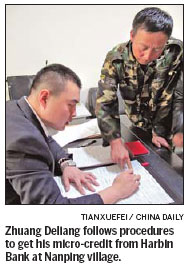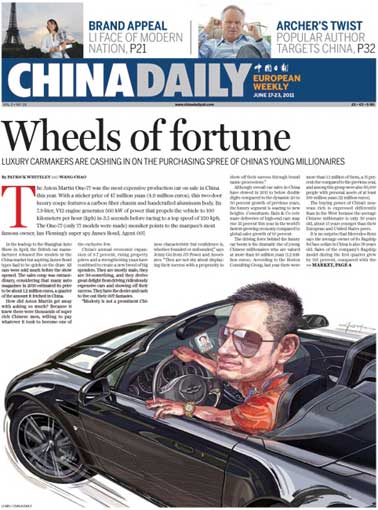Society
Cash caravans bring the bank to villagers
Updated: 2011-06-16 08:09
By Raymond Zhou and Tian Xuefei (China Daily)

The three-vehicle fleet from Harbin Bank whizzes by, turning the heads of farmers in the fields.
The armored jeep, accompanied by a police car and a mobile loan station, usually carries some 10 million yuan ($1.54 million) in bank notes.
"Farmers prefer cash," explains Che Dawei, a manager with the bank.
"We tried to distribute bank cards for security and convenience, but they would withdraw cash immediately. They love the feel of bank notes."
This is Harbin Bank's micro-credit operation, obviously inspired by Mohammad Yunus, the Bangladeshi economist and Nobel Peace Prize winner, but adding a unique Chinese twist.
In Nanping village, 34 km southeast of downtown Harbin, five farmers form a group and await the money, personal seals in hand.
Loan officer Man Chao, with two guards standing behind him, checks each of their personal identifications and asks a few questions.
Several of the farmers are unable to remember their own phone numbers, explaining that, "I don't need to call myself".
That isn't a flash point for suspicion, Che notes, as the elderly may not even know their own ages. They may answer, "I was born when the corn was this high".
A common situation is that they will send a neighbor to collect the money, which is forbidden by the bank.
Zhuang Deliang is getting the 20,000 yuan he applied for a week prior. He has saved up 20,000 ($3,087) and needs the remainder for a harvester. Government subsidies for farm machinery has made it possible at that price.
Zhuang's family of three has three hectares of rice paddies and one dry field for corn. As his 21-year-old son is in college, he and his wife must hire seasonal help to do the harvesting, at 2,250 yuan per hectare. Once he owns a harvester, that money can be saved and he can even rent out the machine to turn a small profit.
Zhuang will repay the loan, plus 2,000 yuan in interest, next summer.
"That's worth it," he says.
"If I can hold the harvest from autumn until next spring, I can sell it at a markup."
Harbin Bank has designed the micro-credit program for farmers' needs.
Its loan officers are known for "not taking cigarettes or drinks from farmers but for counting animals in the barn".
Every officer is responsible for 1,100 to 1,200 accounts, whose family finances and assets are probed. They know what each business is into and what expansion plans are feasible.
But the villages as a whole, rather than the families, are the subjects of risk assessment.
"Those living in the same village tend to have similar creditworthiness," Che explains.
So, the bank assigns every village a credit rating, and on top of that, five families form a mutual guarantee mechanism for credit.
Farming depends on the weather, Che says. As long as there is no severe weather, the small loans are pretty safe and generate stable revenues for the bank - not to mention they support farmers who otherwise have little access to the vast savings the country's banks have accumulated.
By the end of 2010, Harbin Bank had loaned a total of 28 billion yuan to 1 million farmers, accounting for 30 percent of its credit business. Bad loans made up only 0.67 percent.
Now it is pushing the service to places farther away from Harbin and even remote provinces.
China Daily
E-paper

Pret-a-design
China is taking bigger strides to become a force in fashion.
Lasting Spirit
Running with the Beijingers
A twist in the tale
Specials

Mom’s the word
Italian expat struggles with learning English and experiences the joys of motherhood again.

Lenovo's challenge
Computer maker takes on iconic brand apple with range of stylish, popular products

Big win
After winning her first major title, Chinese tennis star could be marketing ace for foreign brands
